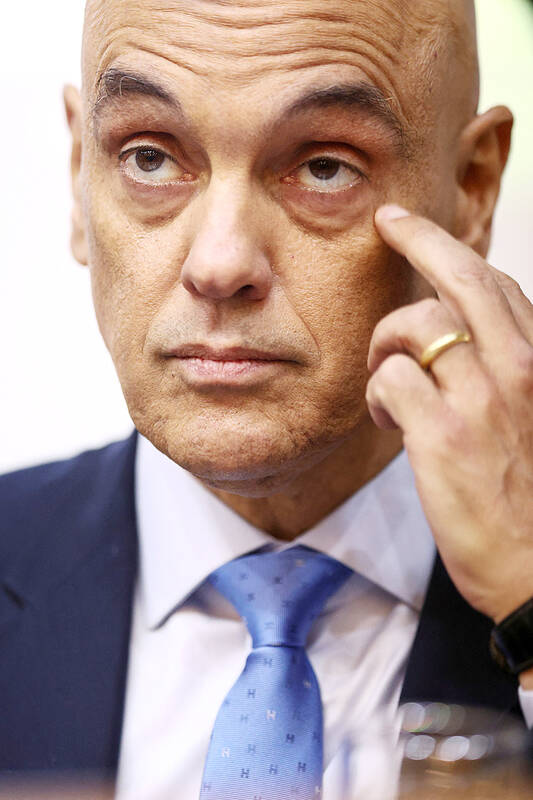A block on X in Brazil took effect yesterday after a Brazilian Supreme Court judge ordered suspension of the social media site.
Brazilian Supreme Court Judge Alexandre de Moraes on Friday ordered the suspension of the platform following a months-long standoff with the US company over alleged disinformation in South America’s largest nation.
Moraes handed down the ruling after X did not comply with an order to name a new legal representative for the company.

Photo: Reuters
Access to X early yesterday was no longer possible for some users in Brazil, who were presented with a message asking them to reload the browser without being able to log in successfully.
X owner Elon Musk said that Moraes was an “evil dictator cosplaying as a judge” and accused him of “trying to destroy democracy in Brazil.”
“Free speech is the bedrock of democracy and an unelected pseudo-judge in Brazil is destroying it for political purposes,” Musk wrote on X.
Moraes ordered the “immediate, complete and comprehensive suspension of the operation of” X in the country, telling the national communications agency to take “all necessary measures” to implement the order within 24 hours.
He threatened a fine of 50,000 reais (US$8,900) to anyone who used “technological subterfuges” to get around the block, such as a virtual provate network.
The judge also demanded that Google, Apple and Internet providers “introduce technological obstacles capable of preventing the use of the X application” and access to the Web site — although he later walked back that order.
The social media platform had more than 22 million users in Brazil prior to the suspension.
Musk shut X’s business operations in Brazil earlier this month, saying that Moraes had threatened the company’s previous legal representative with arrest to force compliance with “censorship orders.”
On Wednesday, Moraes told Musk he had 24 hours to find a new representative or he would face suspension.
Shortly after the deadline passed, X said in a statement that it expected Moraes to shut it down “simply because we would not comply with his illegal orders to censor his political opponents.”
On Thursday, Musk’s satellite Internet operator, Starlink, said that it had received an order from Moraes that froze its accounts and prevented it from conducting financial transactions in Brazil.
Starlink alleged that the order “is based on an unfounded determination that Starlink should be responsible for the fines levied — unconstitutionally — against X.”
Starlink said on X that it intended “to address the matter legally.”

DEMOGRAPHICS: Robotics is the most promising answer to looming labor woes, the long-term care system and national contingency response, an official said Taiwan is to launch a five-year plan to boost the robotics industry in a bid to address labor shortages stemming from a declining and aging population, the Executive Yuan said yesterday. The government approved the initiative, dubbed the Smart Robotics Industry Promotion Plan, via executive order, senior officials told a post-Cabinet meeting news conference in Taipei. Taiwan’s population decline would strain the economy and the nation’s ability to care for vulnerable and elderly people, said Peter Hong (洪樂文), who heads the National Science and Technology Council’s (NSTC) Department of Engineering and Technologies. Projections show that the proportion of Taiwanese 65 or older would

Nvidia Corp yesterday unveiled its new high-speed interconnect technology, NVLink Fusion, with Taiwanese application-specific IC (ASIC) designers Alchip Technologies Ltd (世芯) and MediaTek Inc (聯發科) among the first to adopt the technology to help build semi-custom artificial intelligence (AI) infrastructure for hyperscalers. Nvidia has opened its technology to outside users, as hyperscalers and cloud service providers are building their own cost-effective AI chips, or accelerators, used in AI servers by leveraging ASIC firms’ designing capabilities to reduce their dependence on Nvidia. Previously, NVLink technology was only available for Nvidia’s own AI platform. “NVLink Fusion opens Nvidia’s AI platform and rich ecosystem for

Taiwan Semiconductor Manufacturing Co (TSMC, 台積電) yesterday said it is building nine new advanced wafer manufacturing and packaging factories this year, accelerating its expansion amid strong demand for high-performance computing (HPC) and artificial intelligence (AI) applications. The chipmaker built on average five factories per year from 2021 to last year and three from 2017 to 2020, TSMC vice president of advanced technology and mask engineering T.S. Chang (張宗生) said at the company’s annual technology symposium in Hsinchu City. “We are quickening our pace even faster in 2025. We plan to build nine new factories, including eight wafer fabrication plants and one advanced

‘WORLD’S LOSS’: Taiwan’s exclusion robs the world of the benefits it could get from one of the foremost practitioners of disease prevention and public health, Minister Chiu said Taiwan should be allowed to join the World Health Assembly (WHA) as an irreplaceable contributor to global health and disease prevention efforts, Minister of Foreign Affairs Lin Chia-lung (林佳龍) said yesterday. He made the comment at a news conference in Taipei, hours before a Taiwanese delegation was to depart for Geneva, Switzerland, seeking to meet with foreign representatives for a bilateral meeting on the sidelines of the WHA, the WHO’s annual decisionmaking meeting, which would be held from Monday next week to May 27. As of yesterday, Taiwan had yet to receive an invitation. Taiwan has much to offer to the international community’s